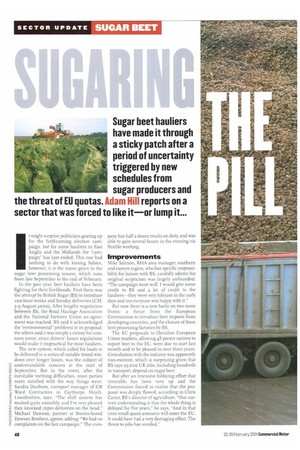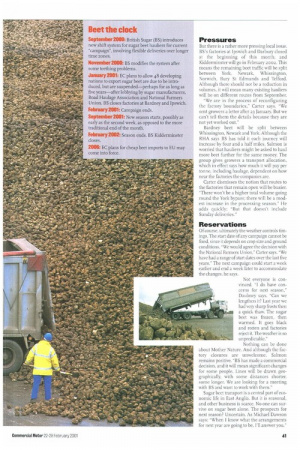R1111111 NO
Page 42

Page 43

If you've noticed an error in this article please click here to report it so we can fix it.
Sugar beet hauliers have made it through a sticky patch after a period of uncertainty triggered by new schedules from sugar producers and Adam HiU reports on a to like it or lump it...
I might surprise politicians gearing up for the forthcoming election campaign, but for some hauliers in East Anglia and the Midlands the "campaign" has just ended. This one had nothing to do with kissing babies, however; it is the name given to the sugar beet processing season, which runs from late September to the end of February.
In the past year, beet hauliers have been fighting for their livelihoods. First there was the attempt by British Sugar (BS) to introduce loo-hour weeks and Sunday deliveries (CM, 3-9 August 2000). After lengthy negotiation between BS, the Road Haulage Association and the National Farmers Union an agreement was reached. BS said it acknowledged the "environmental" problems in its proposal; the others said it was simply a victory for common sense, since drivers' hours regulations would make it impractical for most hauliers.
The new system, which called for loads to be delivered in a series of variable timed windows over longer hours, was the subject of understandable concern at the start of September. But in the event, after the inevitable teething difficulties, most parties seem satisfied with the way things went. Sandra Daubney, transport manager of GR Ward Contractors in Caythorpe Heath, Lincolnshire, says: "The shift system has worked quite smoothly, and I'm very pleased they knocked topm deliveries on the head." Michael Dawson, partner at Boston-based Dawson Brothers, agrees, adding: We had no complaints on the last campaign." The corn pany has half a dozen trucks on duty, and was able to gain several hours in the evening via flexible working.
Improvements
Mike Salmon, RHA area manager, southern and eastern region, who has specific responsibility for liaison with B5, candidly admits his original scepticism was largely unfounded: "The campaign went well. I would give some credit to BS and a lot of credit to the hauliers—they were very tolerant in the early days and not everyone was happy with it."
But now there is a new battle on two more fronts: a threat from the European Commission to introduce beet imports from developing countries, and the closure of three beet processing factories by BS.
The EC proposals to liberalise European Union markets, allowing 48 poorer nations to export beet to the EU, were due to start last month and to be phased in over three years. Consultation with the industry was apparently non-existent, which is surprising given that BS says 23,000 UK jobs, including hundreds in transport, depend on sugar beet.
But after an intensive lobbying effort that timetable has been torn up and the Commission forced to realise that the proposal was deeply flawed, according to Chris Carter, BS's director of agriculture. "Our current understanding is that the whole thing is delayed for five years," he says. "And in that time small quota amounts will enter the EU. It could have had a very damaging effect. The threat to jobs has receded."
Pressures
But there is a rather more pressing local issue. BS's factories at Ipswich and Darbury closed at the beginning of this month, and Kidderminster will go in February 20 02. This means the remaining beet traffic will be split between York, Newark, Whissingion, Norwich, Bury St Edmunds and Telford. Although there should not be a reduction in volumes, it will mean many existing hauliers will be on different routes from September.
"We are in the process of reconfiguring the factory boundaries," Carter says. "We sent growers a letter after 23 January. But we can't tell them the details because they are not yet worked out."
Bardney beet will be split between Whissington, Newark and York. Although the RH A says BS has told it each journey will increase by four and a half miles, Salmon is worried that hauliers might be asked to haul more beet further for the same money. The group gives growers a transport allocation, which in effect says how much it will pay per tonne, including haulage, dependent on how near the factories the companies are.
Carter dismisses the notion that routes to the factories that remain open will be busier. -There won't be a higher total volume going round the York bypass; there will be a modest increase in the processing season." He adds quickly: "But that doesn't include Sunday deliveries."
Reservations
Of course. ultimately the weather controls timings. The start date of any campaign cannot be fixed, since it depends on crop size and ground conditions. "We would agree the decision with the National Farmers Union," Carter says. "We have had a range of start dates over the last five years." The next campaign could start a week earlier and end a week later to accommodate the changes, he says.
Not everyone is con
vinced. do have concerns for next season," Daubney says. "Can we lengthen it? Last year we had very sharp frosts then a quick thaw, The sugar beet was frozen, then warmed. It goes black and rotten and factories reject it. The weather is so unpredictable."
Nothing can be done about Mother Nature. And although the factory closures are unwelcome, Salmon remains positive. -BS has made a commercial decision, and it will mean significant changes for some people. Lines will be drawn geographically, with some distances shorter, some longer. We are looking for a meeting with OS and want to work with them."
Sugar beet transport is a central part of economic life in East Anglia. But it is seasonal, and other business is scarce. No-one can survive on sugar beet alone. The prospects for next season? Uncertain. As Michael Dawson says: "When I know what the arrangements for next year are going to be, I'll answer you."




































































































